#edward iii of england
Text
I’m starting to suspect that GRRM named Alicent Hightower after Alice Perrers, especially if he’s acting on the infamous legend of Edward III’s relationship with her (and Alice generally). It’s obvious, after all, that GRRM took a heavy dose of inspiration for Jaehaerys I from Edward III (albeit less a strictly historical sense of Edward III and more a combination of the general popular idea of him plus that favorite historical fiction grab-bag for GRRM, The Accursed Kings). Like Edward III, Jaehaerys came to the throne as a 14-year-old boy and reigned into his 60s; like Edward III, Jaehaerys succeeded a weak and incapable father to be remembered as a strong and successful king; like Edward III, Jaehaerys was married for over four decades to the (very specifically not beautiful) princess he had wed as a teenager, whom he (supposedly) loved deeply and who represented the beau ideal of medieval/Targaryen queenship; like Edward III, Jaehaerys had a large family but at the end of his life was succeeded not by his much-loved eldest son and heir (nor even his likewise beloved second son), but his most senior grandson. (And this is all without talking about the very obvious comparisons to be made between the Alyssa Velaryon-Rogar Baratheon relationship and regency and that of Queen Isabella and the almost identically named Roger Mortimer.)
So it may have been only natural that GRRM would extend the parallel by naming Alicent after Alice Perrers, who became the mistress of Edward III at some point in the mid 1360s. Would it surprise anyone if GRRM believed, as has been long assumed, that Alice was a young teenager when she became a member of the royal household and the lover of the elder king - perhaps, indeed, the same age as the 15-year-old Alicent was when, having entered the royal household as the daughter of the Hand, she was reading to the elderly and dying Jaehaerys I? Would it surprise anyone if GRRM thought of Alice - widely (if not totally accurately) remembered as grasping and ambitious, manipulating a supposedly feeble and senile king into dumping lands, treasurers, and gold almost literally into her lap - in creating Alicent - a girl whose father (who certainly did not lack for ambition) would later be accused of bringing her to court expressly to win over the future King Viserys I, and who herself would be rumored to have had a sexual relationship with the both aged Jaehaerys as well as the then-married Viserys (perhaps echoing how Alice’s relationship with Edward began while Philippa was still alive)? If Alice is far from a perfect parallel to Alicent (and there are definitely significant differences between the two), I can nevertheless believe GRRM liked the idea of borrowing some surface-level elements of Alice - including, most basically, a version of her name - to use for Alicent Hightower.
#asoiaf meta#alicent hightower#jaehaerys i targaryen#historical parallels#real world inspiration#alice perrers#Edward iii of England
74 notes
·
View notes
Text
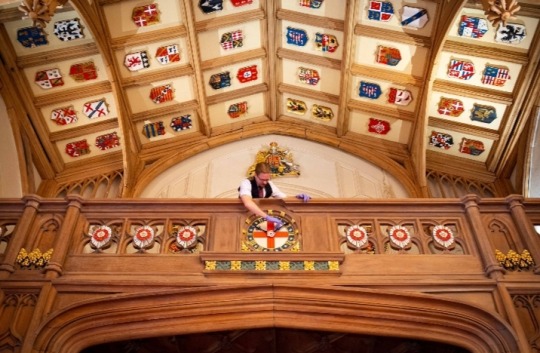
A Conservator adjusts the gallery clock in St George’s Hall at Windsor Castle.
The ceiling above is studded with the coats of arms of all the Knights of the Garter since the foundation of the Order in 1348.
29 October 2023
—
The Most Noble Order of the Garter is an order of chivalry founded by Edward III of England in 1348.
It is the most senior order of knighthood in the British honours system. The only decorations which outrank it in precedence are the Victoria Cross and the George Cross.
The Order of the Garter is dedicated to the image and arms of Saint George, England's patron saint.
#St George’s Hall#Windsor Castle#Knights of the Garter#gallery clock#coats of arms#clock#clock change#Royal Collection Trust#British Royal Family#Most Noble Order of the Garter#Order of the Garter#Edward III of England#Saint George#British honours system#knighthood
12 notes
·
View notes
Text
My Hundred Years War Causes Series
The Hundred Years War did not just begin as a dynastic dispute which left the throne of France having multiple claimants with the death of Charles IV of France, the last male of the mainline of the Capet dynasties, in 1328.
The Hundred Years War did not just begin as a dynastic dispute which left the throne of France having multiple claimants with the death of Charles IV of France, the last male of the mainline of the Capet dynasties, in 1328.
The driving forces behind this conflict were geopolitical, historical, and dynastic disputes over the succession and the expansion of Capet’s dynastic power in France during…

View On WordPress
#100 years war#Edward I of England#Edward III of England#History#Philip II of France#Scottish History
0 notes
Text

Elizabeth of York, fashion character design, c. 1481.
#the wars of the roses#15th century#historical#medieval#british history#medieval england#art#illustration#sketch#edward iv#elizabeth woodville#elizabeth of york#henry vii#henry vi#margaret of anjou#margaret beaufort#isabel neville#richard iii#the white queen#the white princess#medieval fashion#historical fashion#character design#artists on tumblr#medieval costume#royals#house of york#plantagenets
372 notes
·
View notes
Text
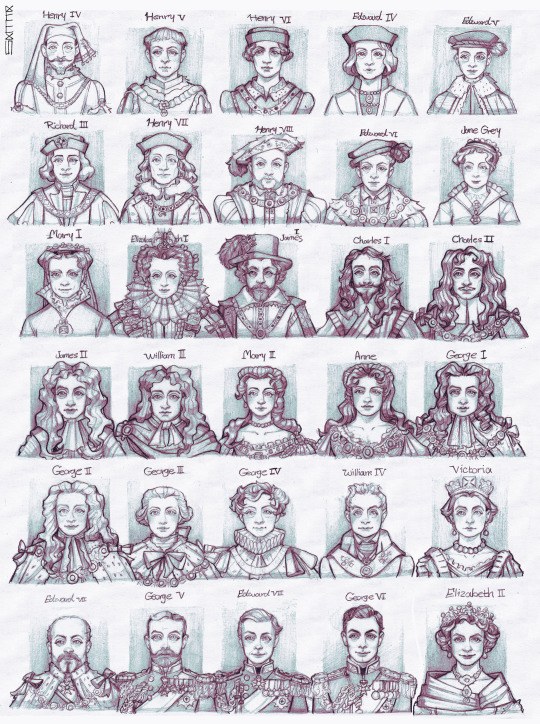
Something I had done years ago on A4 size paper. I think I skipped a few due to lack of space. Kings and Queens of England (after king Henry IV)
#kings of england#artists on tumblr#drawing#traditional art#traditional drawing#Richard III#Henry VII#Henry VIII#Mary I#Elizabeth I#Charles I#Charles II#George III#George IV#Queen Victoria#George v#George VI#Edward VII#queen elizabeth ii#history art
832 notes
·
View notes
Text
We are back for another historical hypothetical folks!
And this time it is:
Think of it as a Midsomer Murders/Clue style thing.
I don’t have an answer for who the victim is. You can choose anyone you want, for the victim.
#historical hypotheticals#historical hypothetical#Polls#tumblr poll#Tumblr polls#historical polls#war of the roses#the war of the roses#wars of the roses#tudors#the Tudors#Tudor England#Henry v#humphrey duke of gloucester#john duke of bedford#richard duke of york#richard plantagenet#edmund duke of somerset#edmund beaufort#richard neville#Richard Earl of Warwick#margaret of anjou#Henry Vi#edward iv#richard iii#henry viii#thomas more#thomas cromwell
109 notes
·
View notes
Text
this is a Princes in the Tower and Edward of Lancaster stan account btw
#I do not want to hear one word against Edward of Lancaster#not a single one#least of all if you're a yorkist stan who thinks that edmund of rutland's death in battle at 17 by his father's enemies is a tragedy#while simultaneously thinking that edward of lancaster's death in battle at the same age by HIS father's enemies is a cause of celebration#deeply embarrassing and unserious behaviour#and where to even start with how the majority of self-declared 'Yorkists' treat the Princes in the Tower 🤡#I've truly never seen anything like it#first they try to vilify two children (including a literal 9-year-old) for being 'Woodvilles'#which in their minds is synonymous to greed/duplicity/ambition/unworthiness aka how they view the Princes' mother#then they try to deny that their vaunted Richard III murdered them even though they're perfectly willing to believe John murdered Arthur#then they try to argue that Richard III was just 'a man of his times' and downplay his actions even though his usurpation and deposition#of his pre-teen nephews absolutely broke all parameters of politically and personally acceptable behaviour in medieval England#then they try to argue that ACTUALLY the Princes don't matter and we shouldn't spend so much time talking about them#(says the person who spends all their time trying to convince people on the internet that Richard didn't kill them)#then they try to argue that finding out what happened to the Princes shouldn't affect our reading of Richard III and won't change how we#view his reign#even though it absolutely affected how contemporaries viewed him and was what provoked opposition to his rule#like. what is happening here. where is this one-sided beef against a long-dead 12-year-old and 9-year-old coming from?#are you okay?
54 notes
·
View notes
Text




King Charles III, Queen Camilla, The Prince of Wales, known as The Duke of Rothesay in Scotland, and The Duke of Edinburgh attend the Order of the Thistle Service at St Giles' Cathedral in Edinburgh, Scotland -July 3rd 2024.
📷 (3) : Andrew Parsons/Kensington Palace.
#king charles iii#king charles#queen camilla#prince william#prince of wales#duke of rothesay#prince edward#duke of edinburgh#british royal family#england#2024#july 2024#order of the thistle service#order of the thistle service 2024#scotland 2024#scotland#the wales#my edit
44 notes
·
View notes
Text

#hundred years war#art#medieval#middle ages#france#england#knights#knight#soldiers#soldier#armour#banner#standard#pennant#history#europe#european#english#french#edward iii#philip vi#john the good#john ii#jean le bon#philippe de valois#edouard iii d'angleterre#battle of crécy#battle of poitiers#warfare#battle
37 notes
·
View notes
Photo








↳ richard iii of england + alphabet
#richard iii#aneurin barnard#the white queen#house york#house plantagenet#history#english history#twq#richard iii of england#anne neville#cecily of york#edward iv#george plantagenet#elizabeth woodville#richard of york#henry vii#margaret of york#john de la pole#historyedit#twqedits*#alphabet*#my gifs#creations*
392 notes
·
View notes
Note
What do you feel about the house of york
I feel like it's a medieval dynasty that one a war. That's about it.
I also think that Richard Duke of York was nothing more than a jealous cousin that saw the perfect opportunity to climb the ladder and took it, justly paying the price. Edward IV's anger over his and his brother's death is understandable and so were his actions. Too bad that he didn't saw that the Duke of York's ruthless ambitions had trickled down to his sons Richard and George before they tried it with him. I think the Woodvilles were overtly greedy and took too much of the hand that fed them making the nobility hate them, and they also paid for it. I mean, arranging prestige marriages for every single Woodville? I get it, one of them was the Queen, but come on now, they clearly overplayed.
On the whole, I find this representation of the Yorks as this typical Good HeirsTM that took their rightful place on the throne and stepped up through harsh times that persists so much to this day lame and reductive. The truth of the matter is, they were never more just and GoodTM than the Lancasters. The Lancasters successfully organized a coup and sat the throne, the Yorks did the same, demonizing Henry VI and Queen Margaret of Anjou through propaganda as a freak and an overly ambitious femme fatale respectively, while casting their teenage son as a cruel bastard. All for defending fiercely what was by right theirs (we have Shakespeare to blame for that as well).
#wars of the roses#house york#house lancaster#edward iv#richard duke of york#george plantagenet#richard iii#Henry vi#margaret of anjou#edward of westminster#medieval warfare#medieval england#late middle ages
36 notes
·
View notes
Text
Elizabeth of York being that iconic that every man who ever met her immediately fell in love with her, she was the darling of her father Edward IV’s eye, had her Uncle Richard III wrapped around her finger and then married her families enemy Henry VII in an arranged marriage but managed to get him to fall head over heals for her. To the point where he was on the short list of Kings in history who never took a mistress, remained loyal to her and is documented as being so depressed and suicidal after her death that he was never the same, and then her son who even though he became such a horrendous man he spent his entire life trying to replace his mother with every woman he met.
41 notes
·
View notes
Text
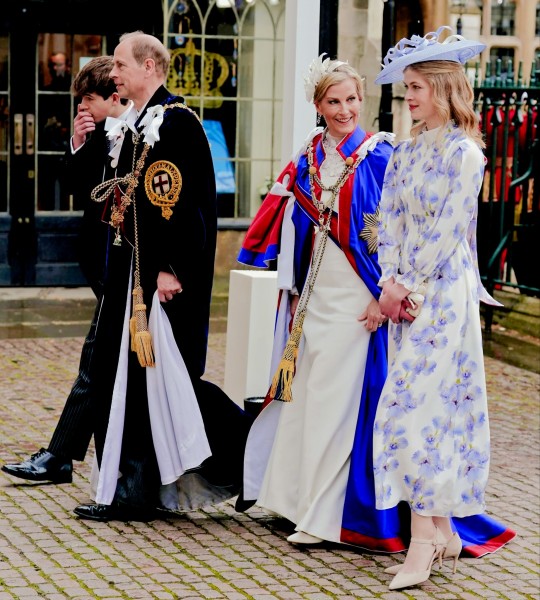
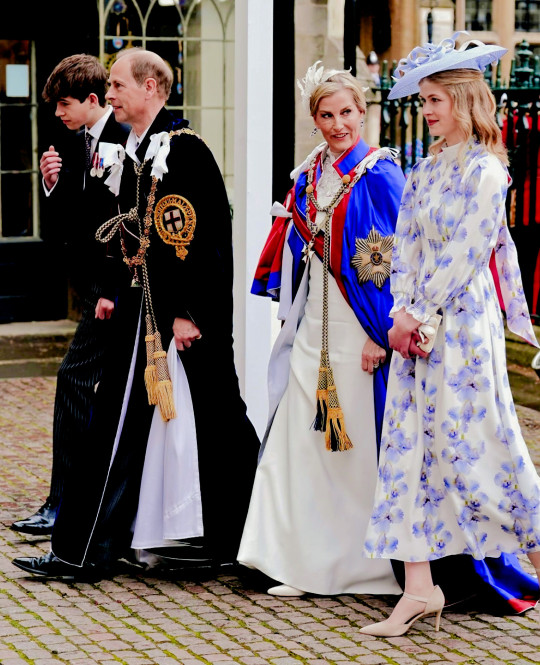
The Duke and Duchess of Edinburgh, Lady Louise Mountbatten-Windsor and James Mountbatten-Windsor, Earl of Wessex attend King Charles III and Queen Camilla's Coronation, at Westminster Abbey in London, England -May 6th 2023.
#prince edward#duke of edinburgh#duchess of edinburgh#lady louise#lady louise mountbatten windsor#james mountbatten windsor#earl of wessex#british royal family#england#2023#may 2023#coronation#king charles iii and queen camilla's coronation#king charles iii's coronation#royal children#my edit
120 notes
·
View notes
Note
Hi! I don't know how much you're interested in the subject today, but considering how i really adored a lot of your opinions/views of the Wars of the Roses and some people involved, especially Richard III, i was wondering how you think a scenerio where Richard remained King for more time or simply won Bosworth would be
Thank you for the teresting question.
Contrary to historical fiction works that portray him as desperate at the Battle of Bosworth, I think it's more likely Richard was hoping to get rid of Henry Tudor quickly and saw him as just a temporary nuisance. If only the battle had happened a couple of days later, when Richard got reinforcements from the North, or if William Stanley had not made the decision to definitely switch sides to Henry, the battle would've probably gone completely differently.
Below is my speculation of what happens if Richard wins:
The immediate outcome seems relatively clear - we know now that Richard was in the middle of secret negotiations with the royal family of Portugal for a double marriage between him and Infanta Joanna, and Elizabeth of York and King's 16-year old cousin Manuel, Duke of Beja, which were apparently going very well. It seems unlikely that Joanna, who had been refusing to get married for so long, would accept, but supposedly the negotiations were going well. We know Richard had sent her a personal letter, so it's fun to speculate what he said that would make her reconsider. I'm thinking he may have talked about religion (as they were both known to be pious) and pitched the marriage in terms of a partnership, and how she could do good for peace and the people of England through charity work (which she was known to do) and maybe even assured her that she wouldn't have to keep having children after she gave birth to an heir? Richard was expected to remarry and have a son after his only legitimate son and his wife died, but going by his choice of bride, he was looking for a great Queen and political partner above all, and not a broodmare - I can't imagine Joanna, who wanted to be a nun and was against marriage, agreeing to keep popping up a child every year or two until she hits menopause. He also may not have been two concerned because he had an heir and spares already, even though not 'of his body'- - his adult nephew John de La Pole and his younger brothers William, Edmund and Richard. The Portugal double marriage would've been a genius political move for many reasons: it would allow Richard to claim that he was ending the York/Lancaster rift for good by marrying Joanna, since the Portuguese royal family were through the female line the main surviving Lancastrian branch; it would fulfil his promise to Elizabeth Woodville that he would find good matches for her daughters in spite of their new 'bastard' status - and how! a Portuguese royal marriage was worthy of a princess* - and could be seen as healing the rift between the Yorkists too (and would at the same time make it impossible for Henry Tudor or anyone else to try to claim the throne of England by marrying her); and it would give England a great, intelligent and respectable Queen, who had experience in ruling as regent and could rule in RIchard's absence when he spent time abroad in wars, and whose reputation for piety and charity for people would help restore his tarnished reputation.
One interesting consequence of his marriage alliance is that Elizabeth of York would eventually have become a Queen Consort, but of Portugal, as Manuel eventually became King.Manuel I in 1495.
Once the situation became more stable, Richard would've probably focused on the things he had already started to do during his short reign - legal reforms aimed mostly at bettering the judiciary and the status of common people, and he would no doubt also want to curtail the power of major noblemen of questionable loyalty such as the Stanleys - and things he is known to have enthusiastically talked about planning to do, such as trying to convince other European countries to mount a campaign to stop the Ottoman Empire's conquests in Europe. (France would be an unlikely ally, Portugal and Burgundy would be obvious ones, and he'd no doubt try to pitch it to the Holy Roman Empire.)
I don't know whether he'd be successful at that, or how long he would live, but a few most obvious historical consequences would be:
the way the previous few decades were remembered in history would be very different, and no one would ever call them the "Wars of the Roses" - which was a name given by Walter Scott in the 19th century based on the fact that Henry VII used the red-white Tudor rose as his sigil, promoting it as a sign of supposed unity between the Lancaster and York dynasties - in spite of the fact that the Lancasters didn't actually use a red rose, or any kind of rose, as their sigil. Henry VII also presented the conflicts that had gone on as a part of one ongoing conflict that he ended with the Battle of Bosworth and by marrying Elizabeth of York. In reality, these were a few conflicts separated by years or even decades in between, and before the battle of Bosworth, the last actual armed conflict fought over the throne of England had been 14 years earlier, when Edward IV won his second and decisive war over the Lancasters. The conflict between the two Yorkist factions after Edward's death did not result in any actual battle (in 1783, Buckingham failed to ignite a rebellion, and his ally Henry turned back to France, realizing the war was lost before it began), so Henry basically 'ended the Wars of the Roses' only after he restarted them in 1485. (Not to mention that Henry had to fight another battle two years later against the Yorkists led by Jon de la Pole, which is always conveniently left out in history books, and had to catch, exile or execute various Yorkist pretenders throughout his reign.) If Henry loses the battle, he becomes only a footnote in history. Edward IV remains considered the one who ended the Lancaster-York conflicts with his decisive victory in 1471. Richard probably manages to be popular and respected king (much more than Henry was with his notorious tax laws) and would likely have claimed to have 'united the York and Lancaster branches' with his marriage to Joanna (though he probably wouldn't have made a huge deal out of it as Henry did, since Henry was promoting himself as the founder of a new dynasty that would start a new era). But what of the Princes in the Tower? Well, we don't know what happened to them and Richard may be suspected to have murdered them, but Henry definitely did imprison 11 year old Edward of Warwick and keep him locked up in the Tower until he was 25 and then executed him on trumped up treason charges just because he was another pretender to the throne, but barely anyone talks about it or cares, so... (insert something about history being written by the winners)
Scotland and England remain separate independent countries. It's very unlikely that the same chain of events would happen where the daughter of a king of England marries a king of Scotland, and then a century later her descendant becomes not just the king of Scotland but also the heir to the throne of England because the ruling dynasty of England died out. There is never a Tudor dynasty, never a Stuart dynasty, never a Hanover dynasty. And there's never a United Kingdom.
There is never such a thing as Anglicanism/the Church of England, with the monarch as its head. Mind you, this doesn't necessarily mean that England remains fully or predominantly Catholic - Protestantism was gaining popularity not just in England (even when Henry was still a devout Catholic) but also in Scotland, which didn't have a Henry VIII splitting with the Pope so he could annul his marriage. It's impossible to tell how exactly the Reformation and Counter-reformation would've affected England under different monarchs and a different dynasty, since so much of the religious strife in the 16th century was linked to Henry's decisions, his break from the Pope, his marriages and annulments and his succession issues, and then with the personalities and backgrounds of his children: Edward as a staunch Protestant (just like his mother's family), Mary as a staunch Catholic (completely unsurprising with her background and the fact that her father broke from the Pope so he could annul his marriage to her mother, proclaiming her a bastard), and then Elizabeth, who couldn't be tolerant to Catholics even if she didn't care about religion, since the Pope and therefore all Catholics considered her a bastard and an illegitimate monarch. How would elderly Richard, and/or his heirs, treat Protestants? What would they think of Martin Luther, or of William Tyndale? It's impossible to tell. He was a devout Catholic, but Protestantism didn't exist at the time, and would he (who was the first of English kings to publish official state documents in English) hate the idea of translating the Bible into English so ordinary people could understand it without the help of clergy? I really don't know, and it's even harder to tell what his heirs would be like in that regard. Would there be more religious tolerance in England? For all we know, it might even be less if a particularly fanatical monarch ended up on a throne... but at least I think I can say with some certainty that English monarchs of this hypothetical York dynasty would have no personal and dynastic reasons to persecute either Protestants or Catholics the way monarchs of the Tudor dynasty had due to their specific circumstances.
#richard iii#english history#henry vii#the wars of the roses#battle of bosworth#the tudor dynasty#edward iv#elizabeth of york#henry viii#church of england#english reformation#wars of the roses
13 notes
·
View notes
Text
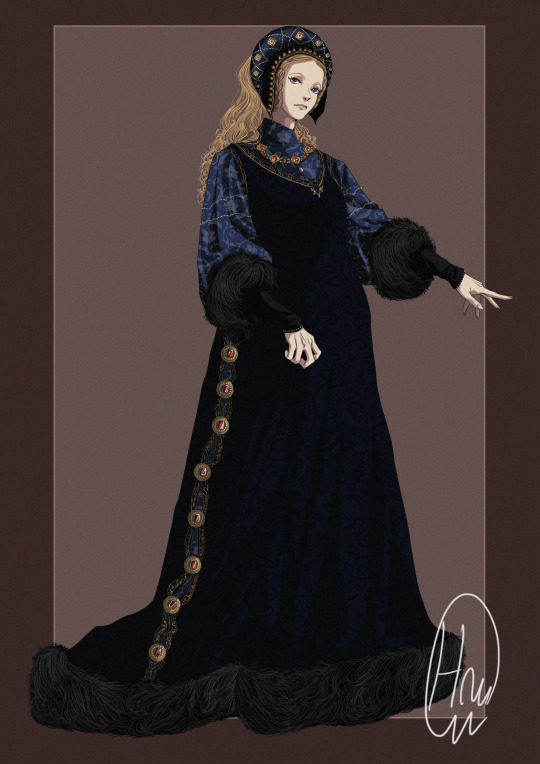
Elizabeth of York, fashion character design. Mourning outfit, c. 1482.
#the wars of the roses#15th century#medieval#middle ages#historical#british history#medieval england#art#illustration#sketch#edward iv#elizabeth woodville#elizabeth of york#henry vii#henry vi#margaret of anjou#margaret beaufort#isabel neville#richard iii#the white queen#the white princess#medieval fashion#historical fashion#character design#artists on tumblr#medieval costume#royals#house of york#plantagenets
387 notes
·
View notes
Text
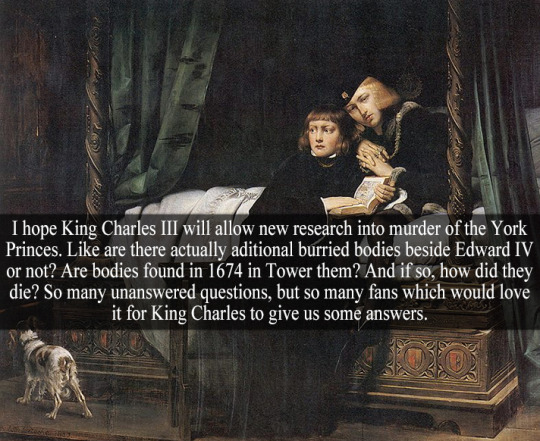
“I hope King Charles III will allow new research into murder of the York Princes. Like are there actually aditional burried bodies beside Edward IV or not? Are bodies found in 1674 in Tower them? And if so, how did they die? So many unanswered questions, but so many fans which would love it for King Charles to give us some answers.” - Submitted by Anonymous
20 notes
·
View notes